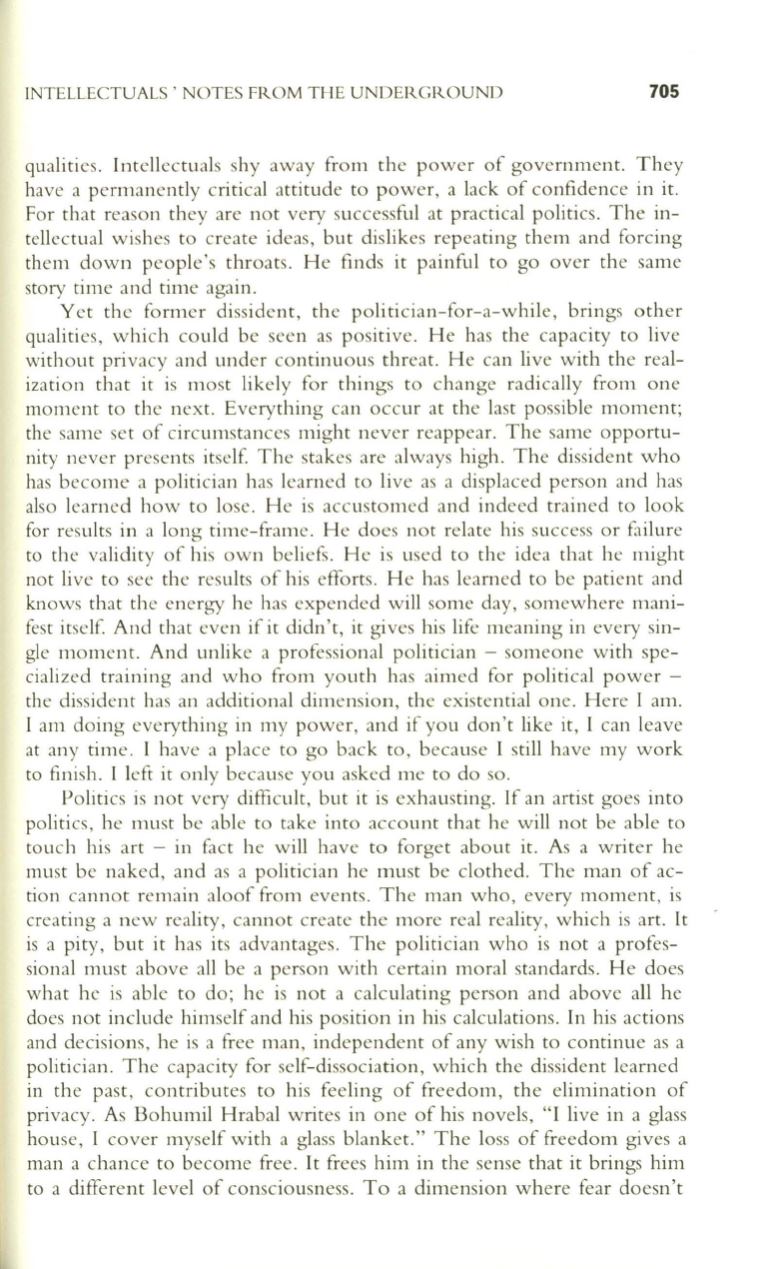
INTELLECTUALS' NOTES FROM T HE UNDERGROUND
705
qualities. Intellec tuals shy away from the powe r of gove rnment. T hey
have a permanently criti cal attitude to power, a lac k of confidence in it.
For that reason they are not very successful at prac ti cal politics. T he in–
tell ectual wi shes to crea te ideas, but di slikes repea ting them and forcing
them down people's throa ts. H e find s it painful to go ove r the same
story time and time again .
Yet the fo rmer di ss ident , th e po liti cian-fo r-a- whiI e, brings o ther
qualiti es, w hi ch could be see n as pos iti ve. H e has the capacity to live
with out pri vacy and under continuo us threa t. He can li ve with the real–
iza ti o n that it is most likely fo r thin gs to change radi ca lly from one
moment to the next. Everything can occur at the last poss ible moment;
the same se t o f circumstances mi ght neve r reappea r. T he same oppo rtu–
nity never presents itself. T he stakes are always hi gh. The dissident w ho
has become a politician has learned to li ve as a di splaced person and has
also learn ed how to lose . He is acc ustomed and indeed trained to look
for res ults in a long time-frame. He does not relate his success or fa ilure
to the validity of his own beli efs. He is used to th e idea that he mi ght
not li ve to see the res ults of hi s effo rts. H e has learned to be pati ent and
kn ows that the energy he has expended will some day, somewhere mani–
fest itse lf. And that even if it didn 't, it gives hi s life meaning in every sin–
gle moment. And unlike a profess ional po liti cian - someone with spe–
ciali zed training and who from youth has aimed fo r political powe r -
the dissident has an additi o nal dimension , the existential one. Here I am .
I am doing everythin g in my power, and if you do n't like it, I can leave
at any time. I have a place to go bac k to, because I still have my work
to fini sh. I left it o nly because you asked me to do so.
Politi cs is not very diffi cult, but it is exhausting. If an artist goes into
politics, he must be able to take into account that he will not be able to
touch hi s art - in fac t he w ill have to fo rget about it. As a writer he
must be naked , and as a politi cian he must be cloth ed. The man of ac–
tion ca nnot remain aloof from events. Th e man who, every moment , is
crea ting a new reali ty, cannot crea te th e more rea l reali ty, which is art. It
is a pity, but it has its advantages. The politi cian who is not a profes–
sional must above all be a person w ith ce rtain mo ral standards. H e does
what he is able to do; he is no t a ca lculating person and above all he
does not include himself and his position in hi s calcul ation s. In his ac tions
and decisio ns, he is a free man, independent of any w ish to continue as a
politi cian. Th e capacity for self-dissociati on , whi ch the dissident learned
in the past , contributes to his feeling o f freedom , the elimin ati o n o f
privacy . As Bo humil Hrabal w rites in o ne of hi s nove ls, " I live in a glass
house, I cove r myself with a glass blanket." The loss of freedom gives a
man a chance to become free. It frees him in the sense that it brings him
to a different level of conscio usness. To a dimension where fear doesn 't


